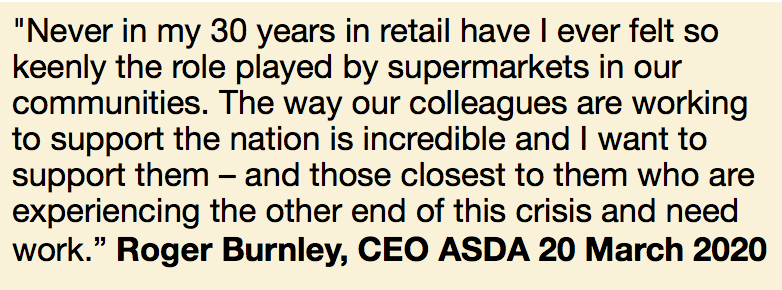
“…. the great test all countries will soon face is whether current feelings of common purpose will shape society after the crisis.” “Virus lays bare the frailty of the social contract – Radical reforms are required to forge a society that will work for all” FT Editorial Board, 3 April 2020
Coronavirus exit strategies can pave the way to a new social contract: where all stakeholders are able to serve society to the best of their abilities, for the benefit of everyone. A new kind of leadership and management practice based on diagnosing true ‘organisational health’ and pursuing Total Stakeholder Value will make this happen.
Amidst the unfolding tragedy of COVID-19, it is heartening to read that the Financial Times sees the present pandemic as an opportunity to rewrite the “social contract”; the moral, political, social and economic relationships that bind us all within civil society. The fact that the FT’s Editorial Board put their collective name to this piece reveals the extent to which the current global crisis is forcing many commentators, business leaders and policymakers to fundamentally rethink organisational purpose, values and principles. In 2012 the Maturity Institute was established with the clear and explicit remit of redefining organisational purpose as the pursuit of maximum societal value. We then set about reworking the systemic foundations for a renewal of corporate legitimacy. By 2017 we had progressed to the stage of producing a blueprint, based on exemplar corporations, as measured against our universal OMINDEX® scale and framework in terms of their Total Stakeholder Value (TSV™).
TSV™ is a contract by which all stakeholders are afforded equity. It also provides a comprehensive, practical roadmap to help society transition away from the ‘shareholder primacy’ era of capitalism that was summarily brought to a close by the US Business Roundtable Statement issued on Monday 19th August 2019. The BRT statement, that ‘all stakeholders matter’, may have been a declaration of intent but it offered no alternative model for a better society; and business was largely carrying on as usual until the global pandemic brought the world economy to a shuddering halt. No doubt most CEOs around the world are viewing this pandemic as catastrophic, from a business viewpoint. Yet the coincidence of this event, following so closely on the demise of shareholder primacy, should be seen as a once-in-a-lifetime opportunity for every single person on the planet to experience a world that is permanently changed for the better.
Forming alliances to build a Total Stakeholder Value society

Roger Burnley’s epiphany (right) is one that awaits the vast majority of boards and CEOs who have been under the yoke of quarterly results for decades. Total Stakeholder Value frees them from this narrow view of ‘performance’ while benefitting shareholders in the process. This is the apparent paradox of maturity – how can everyone gain while no one loses? The answer is very simple, no ‘social’ contract can be fashioned from a zero sum gain; where the shareholder’s gain is society’s loss. Instead, the social contract that underpins OMINDEX® is already proven by exemplar companies. Our TSV™ system is built on the most sustainable foundations that satisfy all the criteria now generically referred to as ESG (environmental, social, governance). So why, and how, should corporations willinglingly enter into this contract, post-COVID-19?
In the last few years, MI has been building partnerships to help corporate management practice transition and transform into Total Stakeholder Value organizations. In 2017, we collaborated with Hermes Investment Management to produce our groundbreaking study of the health of the global banking sector. We have taught our methods on MBA programmes and our evidence has powered research with Cambridge Judge Business School. We have also worked with company valuation and strategy consultants to demonstrate, quantifiably, how human intangibles drive intrinsic company value.
More recently our revolutionary, analytical methods have formed the basis of our alliance with Redburn Research. This enables Redburn equity analysts to use OMINDEX® ratings to integrate ESG into their company analyses and investment appraisals. The analysis they produce will be the world’s first measure of whether business leaders are working to a much more responsible, and financially valuable, social contract. It is already creating excitement within the investment community and is providing a renewed basis for corporate engagement, where everyone is interested in building the most favourable, long-term value outcomes.
OMINDEX® also serves as an organisational diagnostic that provides a clear and simple series of practical steps; that will improve the value of a business, continuously, through its enhanced capability for increasing the value of its people. This model is already working but its continued success is dependent on executives and managers being dedicated to the task of realising true ‘organizational health’. Doctors and nurses are vocationally committed, and bound by oath, to always put the patients’ interests first; even at the personal risks they are now having to endure. This is the same standard MI imposes on management; along with a stipulation that they have to employ the same scientific, evidence-based, methods used by the medical profession for over a century.
Commercial opportunities – emerging market for Mature Leadership & Management
The Maturity Institute is now ready to scale up its range of partnerships by developing professional practice collaborations with organisations and individuals who can adapt their own expertise to work in a mature, and more responsible, capitalist system. We are specifically seeking alliances with organisations engaged in board and c-suite advisory & consultancy; audit and accounting; and risk management. Alternatively, if you already have well developed skills and experience in the following areas, we would like to hear from you.
- Corporate values and purpose, high level decision making
- Human capital measurement and realisation of value
- Organisational culture, trust, cooperation, communication
- Systems analysis including human systems; quality systems; performance management systems; learning systems; employee innovation systems
- Evidence based management of ‘intangibles’; use of the scientific method
- Organisational restructuring
If you would like to register your initial interest please contact stuart.woollard@omservices.org
Comments are closed